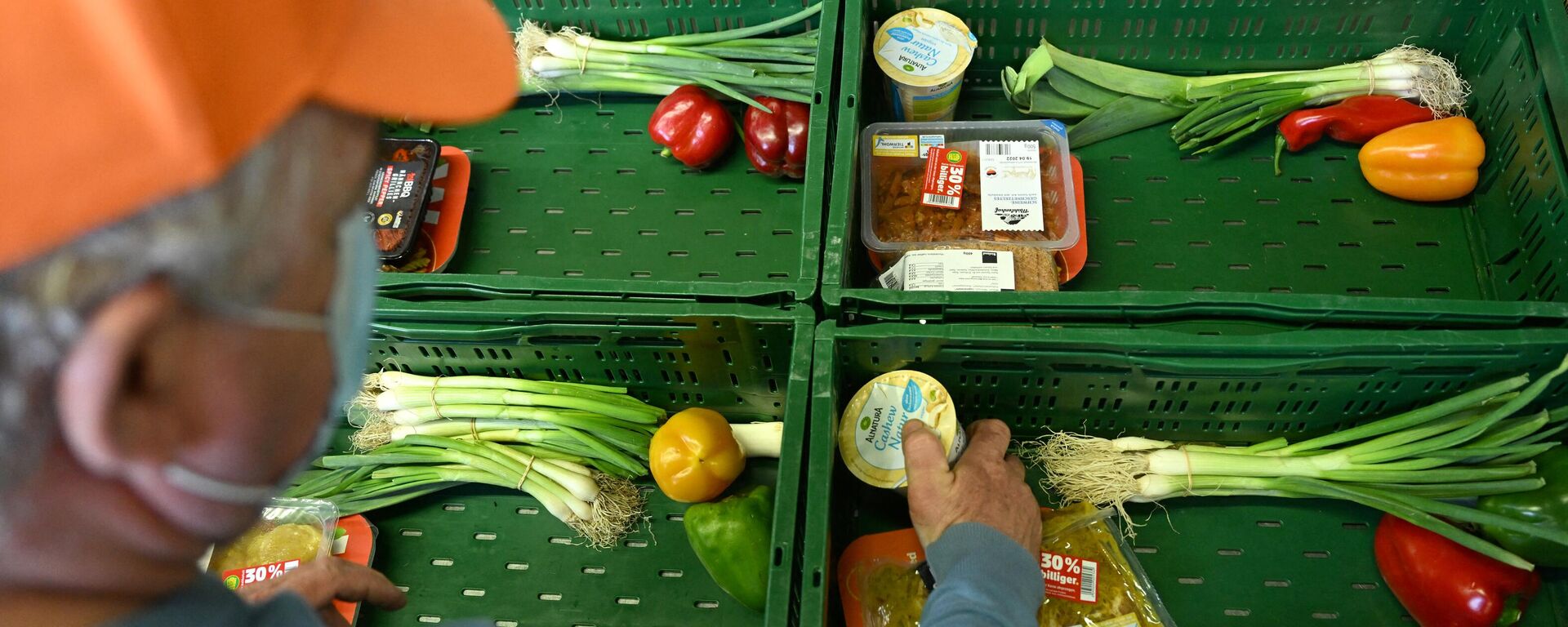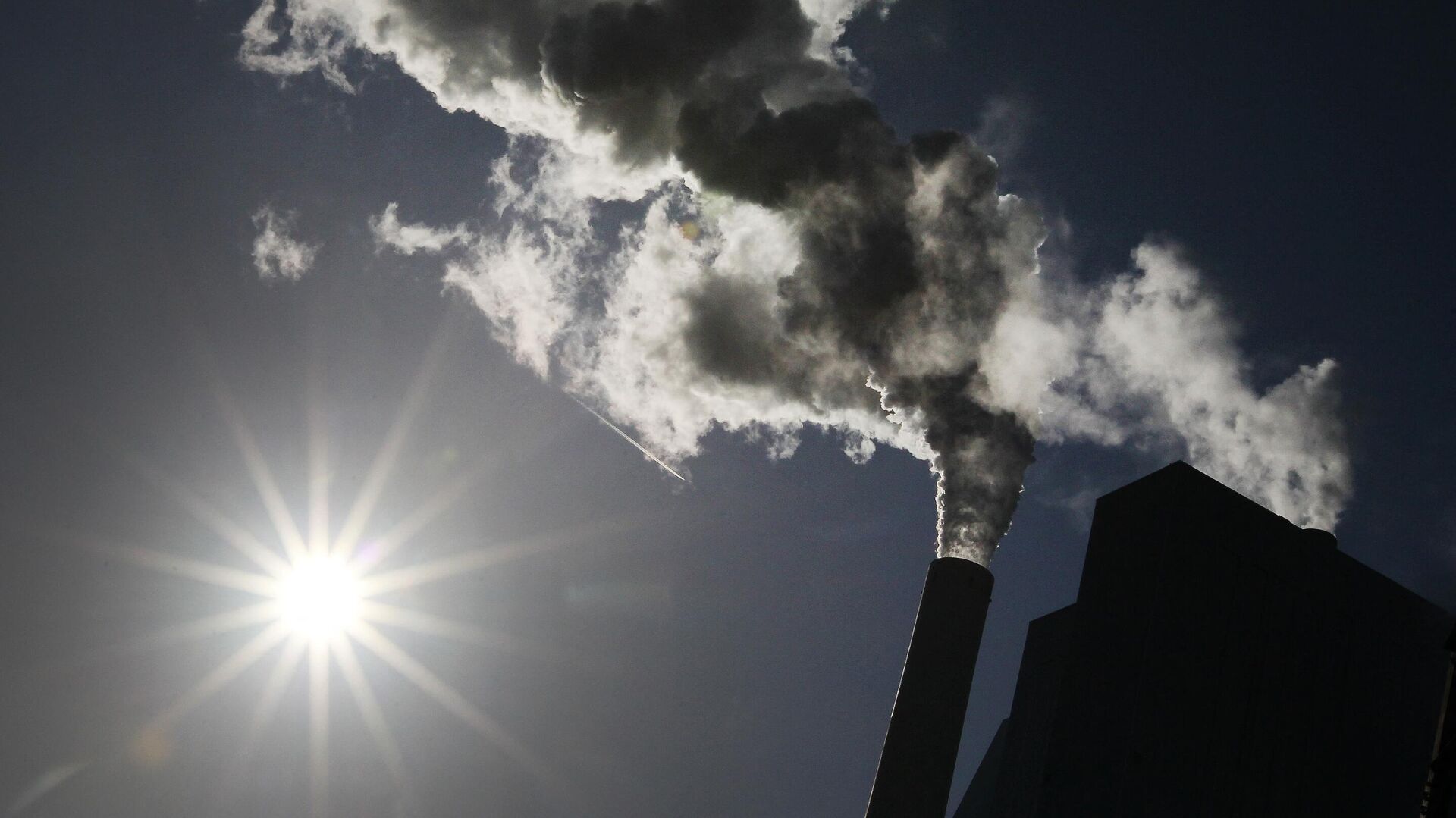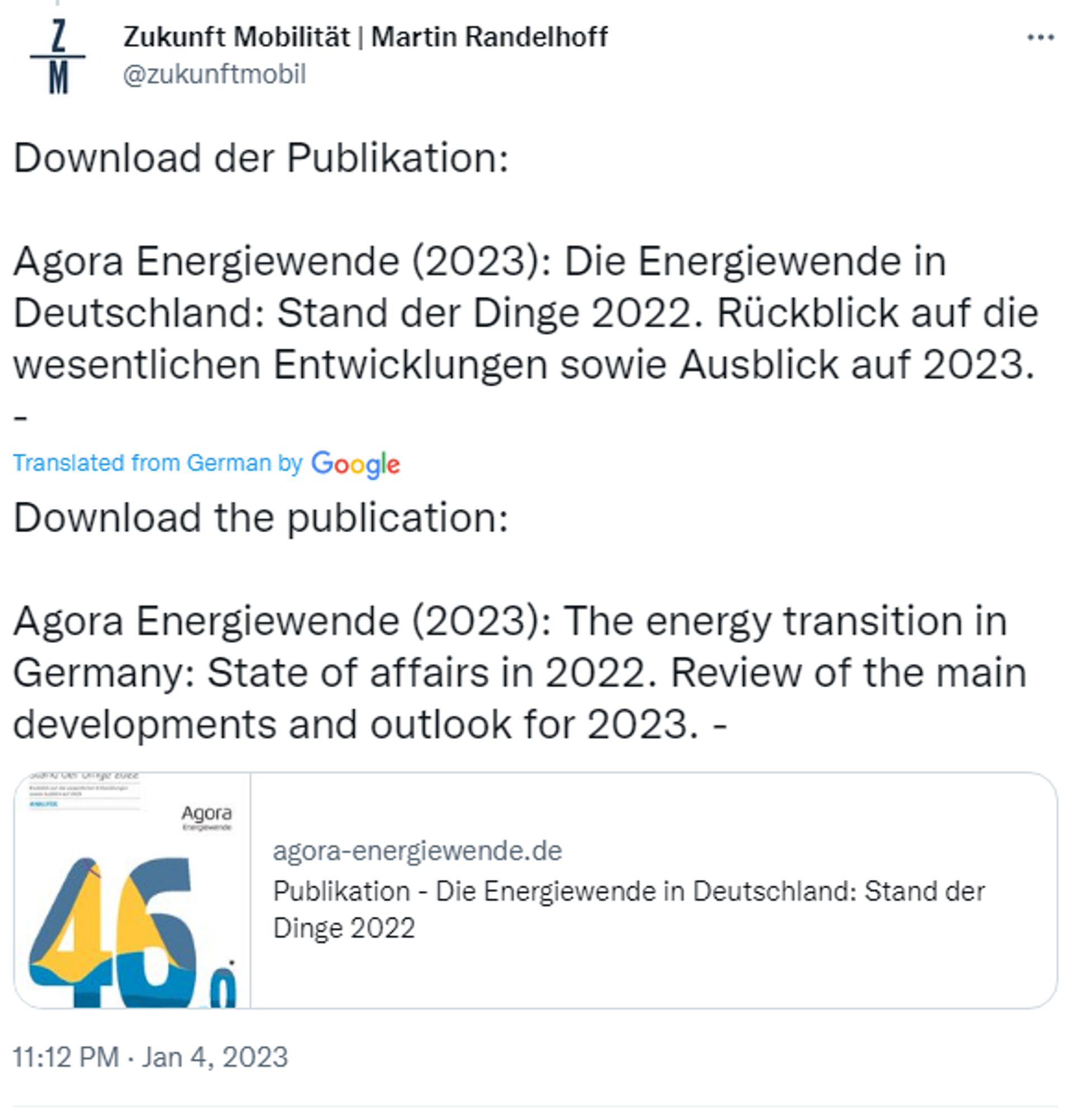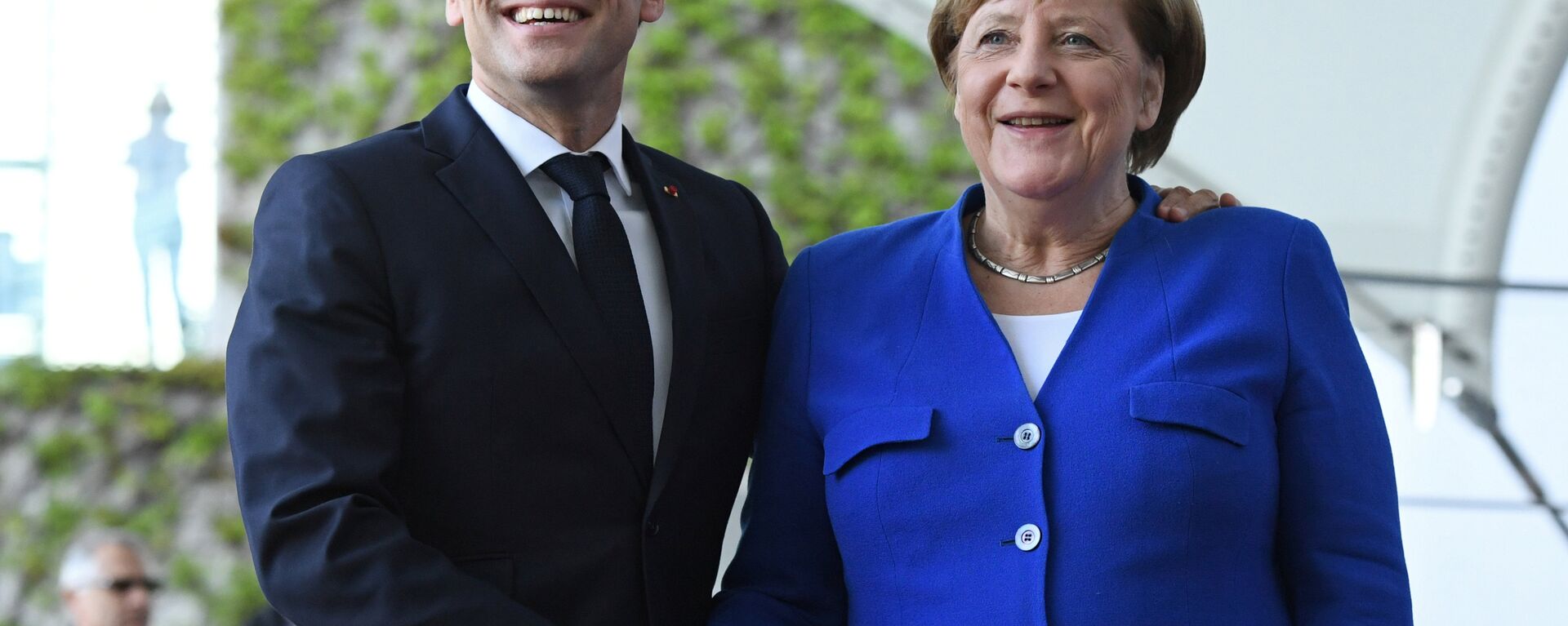https://sputnikglobe.com/20230105/berlins-co2-emissions-behind-schedule-think-tank-says-1106058352.html
Berlin’s CO2 Emissions 'Behind Schedule,' Think Tank Says
Berlin’s CO2 Emissions 'Behind Schedule,' Think Tank Says
Sputnik International
Germany's current carbon dioxide emissions are jeopardising the country’s ambitious climate goals, think tank Agora Energiewende has warned.
2023-01-05T12:03+0000
2023-01-05T12:03+0000
2023-01-05T12:03+0000
world
germany
emissions
carbon dioxide
co2 emissions
greenhouse gas
angela merkel
sanctions
https://cdn1.img.sputnikglobe.com/img/07e7/01/05/1106056258_0:215:2875:1832_1920x0_80_0_0_db09e2bb2c9bd3cbc49e43ad148a5905.jpg
Amid a surge in the use of oil and coal in 2022 to make up for waning gas deliveries, Germany's current carbon dioxide emissions are jeopardizing the country’s ambitious climate goals, the think tank Agora Energiewende has warned.Back in 2021, under then-Chancellor Angela Merkel, Berlin set itself the target of slashing emissions by 65 percent by 2030, compared with 1990, and by 2024 becoming carbon-neutral. However, Germany's greenhouse gas emissions totalled close to 761 million tons last year, stalling behind the 2020 target of a 40 percent cut as compared to 1990, the think tank underscored.Behind ScheduleWhile the country's energy consumption in 2022 dropped by 4.7 percent year-on-year, and renewables reached a record 46 percent share of it, surging costs and a drop in Russian gas imports amid the sanctions campaign unleashed by the West ran roughshod over these efforts. The industrial powerhouse began to urge its citizens to implement a personal economy drives amid Europe’s largely self-inflicted energy crisis. As Berlin joined the European Union’s campaign of anti-Russian sanctions over Moscow's military operation in Ukraine, the restrictions produced a boomerang result, affecting Germany’s industry, businesses, and citizens. As part of the measures to offset the energy crisis, Germany conceded to demands to reactivate coal-fired power plants or extend their lifespan. Implementing such measures is what made Germany fall behind schedule with its climate goals, Simon Mueller, Agora’s director in Germany, underscored.While the industrial sector met its emissions-slashing goal by eight million tons last year, it was the transport and building sectors that missed their annual targets, according to Agora, which added:Economy Minister Robert Habeck, however, insisted that Germany was on course to reach its targets, pointing to a swathe of bills passed last year to boost renewable energy growth. This comes as Germany’s government has found itself in the midst of a spat with the transport sector. Volker Wissing, Free Democrat (FDP) minister of transport and digitalization, has obdurately resisted mulled emissions cuts in his sector. The FDP's green coalition partners have slammed Wissing for failing to stand by Germany’s supreme constitutional court climate protection ruling dating from 2021. The country's transport sector has been reluctant to show progress in emissions reduction in recent years, critics stated, amid its focus on road transport and passenger vehicles.
https://sputnikglobe.com/20221209/more-than-one-in-three-germans-expect-decline-in-income-in-2023---1105270383.html
https://sputnikglobe.com/20190515/germany-climate-plea-criticism-1075019616.html
germany
Sputnik International
feedback@sputniknews.com
+74956456601
MIA „Rossiya Segodnya“
2023
News
en_EN
Sputnik International
feedback@sputniknews.com
+74956456601
MIA „Rossiya Segodnya“
Sputnik International
feedback@sputniknews.com
+74956456601
MIA „Rossiya Segodnya“
germany, surge in use of oil and coal in 2022, greenhouse gas, co2 emissions, waning gas deliveries, boost to renewable energy production, energy crisis, sanctions campaign unleashed by the west, transport and building sectors missed annual targets
germany, surge in use of oil and coal in 2022, greenhouse gas, co2 emissions, waning gas deliveries, boost to renewable energy production, energy crisis, sanctions campaign unleashed by the west, transport and building sectors missed annual targets
Berlin’s CO2 Emissions 'Behind Schedule,' Think Tank Says
The government of former German Chancellor Angela Merkel set itself ambitious climate goals in 2021, seeking to cut carbon emissions by 65 percent by 2030, and hoping to become carbon-neutral by 2045.
Amid a surge in the use of oil and coal in 2022 to make up for
waning gas deliveries, Germany's current carbon dioxide emissions are jeopardizing the country’s ambitious
climate goals, the think tank Agora Energiewende has warned.
Back in 2021, under then-Chancellor Angela Merkel, Berlin set itself the target of slashing emissions by 65 percent by 2030, compared with 1990, and by 2024 becoming
carbon-neutral. However, Germany's greenhouse gas emissions totalled close to 761 million tons last year, stalling behind the 2020 target of a 40 percent cut as compared to 1990, the think tank underscored.
“The increased use of coal and oil nullified the reductions in emissions through energy savings,” the Berlin-based think tank said
in a statement on January 4.
While the country's energy consumption in 2022 dropped by 4.7 percent year-on-year, and renewables reached a record 46 percent share of it, surging costs and a drop in Russian gas imports amid the sanctions campaign unleashed by the West ran roughshod over these efforts. The industrial powerhouse began to urge its citizens to implement a personal economy drives amid Europe’s largely
self-inflicted energy crisis.
As Berlin joined the European Union’s campaign of anti-Russian
sanctions over Moscow's military operation in Ukraine, the restrictions produced a boomerang result, affecting Germany’s industry, businesses, and citizens. As part of the measures to offset the energy crisis, Germany conceded to demands to reactivate coal-fired power plants or extend their lifespan.
Implementing such measures is what made Germany fall behind schedule with its climate goals, Simon Mueller, Agora’s director in Germany, underscored.
While the industrial sector met its emissions-slashing goal by eight million tons last year, it was the transport and building sectors that missed their annual targets, according to Agora, which added:
“This is an alarm signal with regard to the climate targets.”
Economy Minister Robert Habeck, however, insisted that Germany was on course to reach its targets, pointing to a swathe of bills passed last year to boost renewable energy growth.

9 December 2022, 12:12 GMT
This comes as Germany’s government has found itself in the midst of a spat with the transport sector. Volker Wissing, Free Democrat (FDP) minister of transport and digitalization, has obdurately resisted mulled emissions cuts in his sector.
The FDP's green coalition partners have slammed Wissing for failing to stand by Germany’s supreme constitutional court climate protection ruling dating from 2021. The country's transport sector has been reluctant to show progress in emissions reduction in recent years, critics stated, amid its focus on road transport and passenger vehicles.
“We all agree that there is a big gap that still needs to be filled... But, the ministry of transport says: it’s a little less. We say: a little more,” Robert Habeck stated on January 3.





